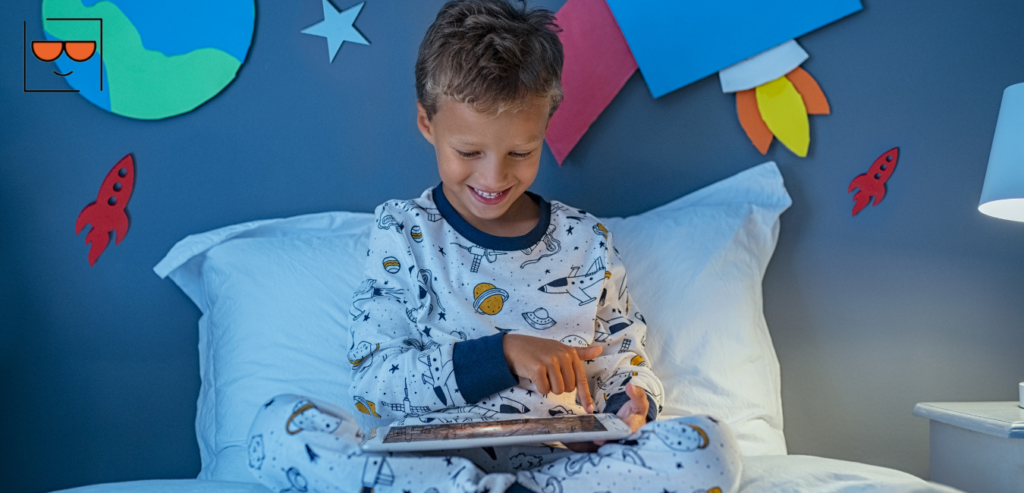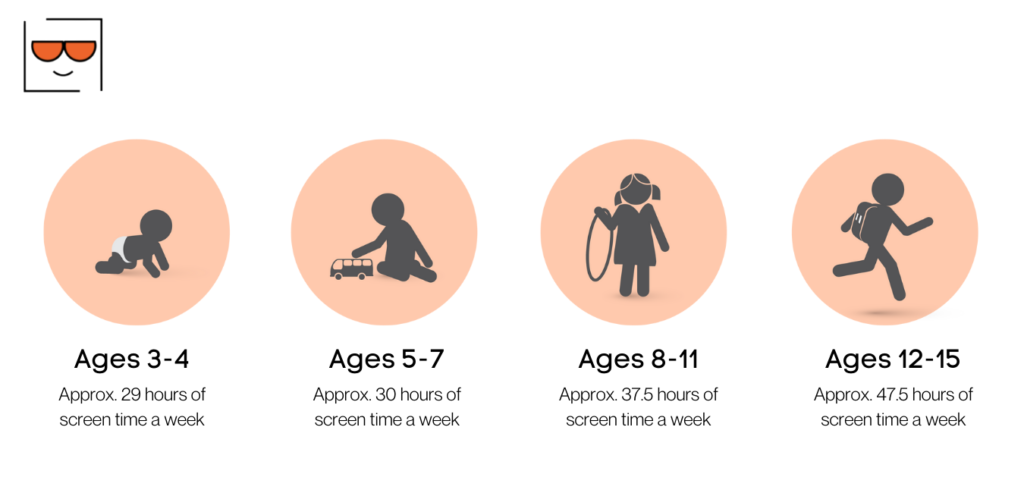
Smartphones, tablets, and other mobile devices can be a huge help for parents, from keeping kids entertained in the car to educational apps to learn their numbers. In addition, screen time can do children a lot of good. However, as handy as they are, these blue light-emitting devices have several downsides, the most impactful being the quality and quantity of sleep our kids are receiving. But how exactly does blue light affect our children’s sleep cycle?
Children’s Exposure to Blue Light
It’s not unusual to see toddlers playing on tablets or teenagers falling asleep with their phones. However, how much time are our kids spending in front of the screen?

Our eyes constantly absorb blue light. Our primary source for blue light came from the sun. However, unlike tablets and smartphones, the sun doesn’t follow our children into their bedrooms at night. The amount of blue light exposure to children is not necessarily the issue, but how blue light is absorbed and the time of day is. How is the artificial blue light emitted from devices at night harmful to your child’s sleep cycle and circadian rhythm?
Blue Light and Children’s Sleep Cycle
Blue light rays affect our circadian rhythm more than any other type of light, boosting attention, improving our mood, and even increasing reaction times. However, children no longer need to be stimulated when it gets near bedtime. Instead, their bodies need to prepare them for bed. Exposing children to harmful blue light could be doing the very opposite.
During the daytime, suppressing melatonin production is a good thing. It helps us stay alert and think clearly. However, once it begins to get dark, the reducing light passing into your eyes signals to the brain that bedtime is near. Melatonin, the sleep-inducing hormone, is then released.
However, when children use blue light-emitting devices long into the evening, it keeps them wired when they should be yawning. The increased neurological activity stimulated by the blue light will disrupt their body’s natural clock and suppress melatonin secretion. In addition, researchers have found that children who have not yet gone through puberty experience significantly more melatonin suppression due to evening light compared with post-puberty adolescents.
Lastly, blue light can further disrupt your child’s sleep by preventing quality sleep. Sensors in the human eye send information to the brain that regulates sleep patterns. These sensors are susceptible to blue light and can further damage your child’s circadian rhythm. For example, Harvard researchers found that 6.5 hours of blue light exposure hinders melatonin for twice as long as other types of visible light, delaying sleep up to three whole hours.
Harmful Effects of Blue Light is at Night
As parents, we have all experienced the consequences of our children having sleepless nights, mood swings, grogginess, and short attention. But did you know that longer-term sleep loss could affect your child more than just a few temper tantrums?
Sleep-deprived children are likely to have behavioral problems such as aggression or hyperactivity and struggle to succeed in school. For example, a study performed in 2017 found that after tracking over a thousand children since birth, revealed those preschoolers and toddlers who did not receive an adequate amount of sleep had issues with emotional control, attention, and problem-solving abilities at the age of 7. In addition, similar to that of adults, children with sleep deprivation are at risk for weight gain, immune health, cell repair, diabetes, and other serious physical health issues as they age.
Your child’s growth and development needs to receive proper sleep by limiting the amount of blue light consumed in the evenings.
How to Help Reduce Blue Light at Night
You can help eliminate or reduce the amount of blue light in your child’s life by following some of our top tips for sleep-friendly lighting.
- Replace the bathroom light with an amber night light
- Restrain from the use of screen-based device three hours before sleeping or use blue light blocking glasses or blue light filters if unavoidable
- Dim the lights in your home or use a sleep light bulb and close the blinds after sunset
- Opt for an amber night light if your child is afraid of the dark
Wrapping Up
Blue light in the evening can be unhealthy for your child and result in severe repercussions for their health and education. If your child is continually up into the late hours of the night, try some of our top tips above to help ensure your child is getting the quality and quantity of sleep they need.
Ready to reduce your child’s blue light exposure?
Check out our products today!

 10% off Blue-Free Motion Sensing Light with Coupon Code BLUEMOTION10
10% off Blue-Free Motion Sensing Light with Coupon Code BLUEMOTION10